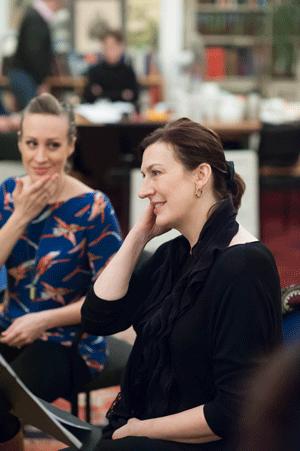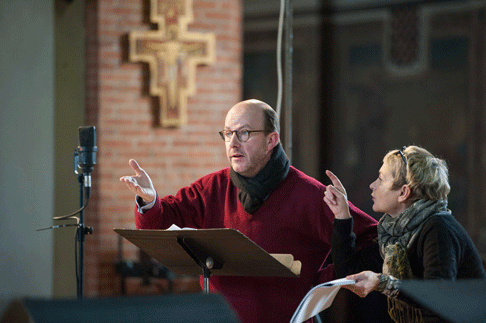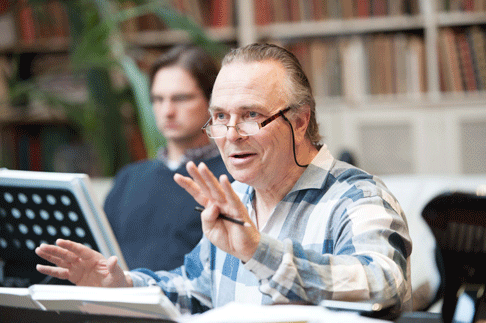 Brenda Rae and Sarah Connolly
Brenda Rae and Sarah Connolly
On the evidence
of this first UK performance by the Orchestra of the Age of Enlightenment and
Opera Rara, this failure was certainly not a result of a dulling of
Offenbach’s characteristic wit or for want of a lively tune or two.
Jean-Christopher Keck — who is responsible for this new performing edition
of Fantasio (the original was lost when the Salle Favart, home to the
Opéra-Comique burned to the ground in 1887) — suggests that the opera bombed
largely because of bad timing. As a German-born Frenchman writing during the
aftermath the Franco-Prussian war, Offenbach was not popular among the
musicians of the Opéra-Comique. Moreover, the French, eager for some light
relief following the deprivations of war and their recent defeat by the forces
of the German coalition, were probably less than delighted to be presented with
an opera based on a play by Alfred de Musset which had had little success when
staged at the Comédie-Française in 1866 and which, to top it all, was set in
Munich.
Whatever the merits of de Musset’s drama, the libretto which his brother
Paul fashioned from the original play is a rather limp affair lacking either
the sparkle and zest of La vie parisienne, or the shadows and
complexity of Les contes d’Hoffmann.
The beautiful Bavarian princess, Elsbeth, who is mourning the death of the
court jester, Saint-Jean, has been betrothed by her father to the Prince of
Mantua. The Prince has arrived with aide, Marinoni, to claim his bride, and is
greeted by crowds of festive townspeople eager to celebrate the nuptial union.
The students, however, do not share the general mood of euphoria; in
particular, the melancholy dreamer, Fantasio, feels pity for the princess who
is to be wed to a complete stranger. He decides to don the deceased jester’s
costume, in order to approach the princess; the disguise will also,
fortuitously, divert the police who are chasing him for bad debts.
 Neal Davies
Neal Davies
For reasons not entirely clear, Marinoni and the Prince swap identities, and
when the ‘Prince’ is introduced to Elsbeth, Marinoni’s less than
aristocratic comportment does not make a good impression on the princess. Her
first meeting with Fantasio is hardly more promising, for she objects to the
scholar’s ironic garb, but his waggishness and kindness soften her heart.
Meanwhile, Elsbeth’s page, Flamel, has discovered the Prince’s subterfuge;
when all are gathered in public, the ‘jester’ fulfils his courtly role by
wickedly flipping the royal imposter’s wig into the air. Ailing in gaol as a
result of his impertinence, Fantasio is rescued by the now enamoured princess,
who gives him the key to her garden. The humiliated and Prince and the enraged
King are about to declare war between their two nations, when Fantasio
intervenes and pleads for peace. The Prince decides that Elsbeth is not the
bride for him and sets off home. The King rewards Fantasio for his services,
naming him a Prince; when Fantasio tries to return the key to Elsbeth, she
urges him to keep it.
Offenbach’s score contains many musical gems, but
the overture gives little hint of the treasures to come. During the slow,
mysterious introduction, Mark Elder, conducting without a baton, subtly coaxed
some delicate playing from the instrumentalists of the Orchestra of the Age of
Enlightenment. The wide tessitura — gentle flutes aloft, unison celli below
— and airy texture, together with the rather tentative melodic gestures,
created an ambiguous, slightly unsettling tone, before the launch of a zippy
allegro got the show on the road. But, the overall effect was rather
fragmented.
This faltering forward momentum was a problem throughout the first act, with
its fairly long exposition. Perhaps a staged production would create more
dramatic drive, but here the spoken dialogue — even though the French was
delivered with panache — and standard evening wear, barring Fantasio’s
colourful jackets, made things feel rather sluggish.
The mood whipped up in the second act, though; for it’s here that the
trademark Offenbach show-stoppers — offering both froth and charm, rapture
and serenity — are to be found. And, it was also here that American soprano
Brenda Rae’s star quality was revealed. As Elsbeth, in her first Act aria
Rae’s rather understated downheartedness did not make much of an impression,
the voice generally light and pleasant but lacking strong characterisation.
However, in ‘Quand l’ombre des arbres’ the bright clarity, gleaming tone,
pinpoint accuracy and sheer stylishness of Rae’s virtuosic runs, leaps and
twirls were remarkable; despite the technical challenges she truly acted with
her voice. The feistiness and pettishness beneath the decorous young maiden’s
obedience came to the fore, particularly in the subsequent duet, ‘Je n’ai
donc rien de plu pour consoler mon coeur’, when she pours out her heart to
Fantasio: “When you’re sixteen you still have time to be miserable”!
 Sir Mark Elder
Sir Mark Elder
The title role seems tailor-made for Sarah Connolly’s luscious mezzo, as
perfectly fitted as her gorgeous burgundy velvet jacket; but while she
certainly looked the part and used the rich depths of her voice with customary
acumen, Connolly’s melancholy dreamer, all brooding reflection and
self-absorption, didn’t have quite enough spirit and romantic fire. It
didn’t help that she was rather bound to the score, especially in the spoken
dialogue, and in contrast to most of the other principals. Fantasio’s opening
Act 1 aria, ‘Voyez dans la nuit brune’, in which he addresses the moon
marvelling at its beauty, was suitably meditative and contained; and Connolly
sustained a beautiful line in the Act 3 duet when, languishing in his prison
cell, Fantasio is visited by Elsbeth, who fears that his bravery has been in
vain and her marriage is inescapable. But, elsewhere I’d have liked a bit
less Hoffmann-esque introspection and more roguishness and comic élan.
As the Prince and his manservant, baritone Russell Braun and tenor Robert
Murray were a superb double act. They relished the score’s wit, and the
energy of their exchanges made the farcical costume-swapping seem
‘credible’ — even as they wryly traded one black jacket for another!
Braun’s naval-gazing aria, ‘Je ne serai jamai aimé pour moi-même’, was
robust and fittingly narcissistic — ‘What rapture I’d feel if I were ever
loved for myself’: the beautifully controlled weightlessness of
‘rapture’, complemented by some lovely woodwind solos, revealed the extent
of the Prince’s solipsism. Murray’s Act 3 aria, ‘Reprenez cet habit mon
prince’, as Marinoni hands back his master’s finery, was well-acted, the
tone earnest, the trills graceful.
The rest of the cast were committed and uniformly more than competent. As
Flamel, mezzo-soprano Victoria Simmonds sang with warmth and focus. Brindley
Sherratt was appropriately regal in manner as the Bavarian monarch, but might
have employed a touch more heft to suggest the weight of imperial haughtiness.
Bass-baritone Neal Davies was excellent as Sparck, aptly conveying the buoyant
confidence of youth; Aled Hall (Facio) and Gavan Ring (Hartmann) were
convincing as his fellow students.
The Opera Rara Chorus were in gloriously full voice, responding with vigour
to Elder’s encouragements — although at times, and perhaps understandably,
heads were buried in scores. Elder made certain that every instrumental detail
in the score was cleanly heard; pizzicati were precise and meaningfully placed,
there was some lovely playing from the first horn, extending and duetting with
the vocal melodies, and Pierre Doumenge’s cello solo was expressively
executed. In the Act 2 prelude, imposing divided cello were balanced by the
tender grace of the violin melody; at the start of Act 3, the blare of the
brass was countered by the solo oboe’s seductive curling arcs. There are some
self-quotations and some humdrum passages in the score, but Elder made sure
that the moments that count really did speak. He even grabbed some of the
dramatic limelight, as the tailor to whom Fantasio resorts to purloin the late
jester’s gaudy motley.
Inevitably, there were some theatrical coups that did not come off on the
concert platform, but some gentle, self-aware irony helped to smooth over the
cracks. I felt that Elder might have stirred up the tempo still further,
particularly in the act finales; perhaps in the theatre things would more
naturally race along. I’m not sure that Fantasio has sufficient
dramatic interest and coherence to deserve the epithet, ‘masterpiece’ (the
opening is slow, and the third act finale a little cumbersome); but this
welcome and accomplished performance certainly made a persuasive case for its
musical merits.
Claire Seymour
Opera Rara will release a CD recording of Fantasio
in 2014.
Cast and production information:
Brenda Rae, Elsbeth (La Princesse); Sarah Connolly, Fantasio;
Victoria Simmonds, Flamel; Robert Murray, Marinoni; Russell Braun, Le Prince;
Neal Davies, Sparck; Brindley Sherratt, Le Roi; Aled Hall, Facio; Gavan Ring,
Hartmann; Sir Mark Elder, conductor; Orchestra of the Age of Enlightenment;
Opera Rara Chorus. Royal Festival Hall, London, Sunday, 14th
December 2013.



